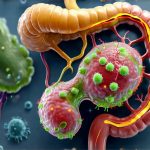The human digestive system is an incredibly complex ecosystem, responsible not just for breaking down food but also for absorbing vital nutrients and playing a significant role in overall health. Maintaining a healthy gut isn’t simply about avoiding problematic foods; it’s fundamentally linked to the trillions of microorganisms that reside within our intestines – collectively known as the gut microbiota. These microscopic inhabitants have a profound impact on everything from immune function to mental wellbeing, and understanding how we can support their balance is key to optimizing digestive health.
The delicate interplay between bacteria, fungi, viruses, and other microbes in the gut shapes our individual responses to food, influences inflammation levels, and even impacts medication efficacy. Disruptions to this microbial ecosystem, often caused by factors like diet, stress, or antibiotic use, can lead to a variety of digestive issues. Increasingly, research is highlighting the potential benefits of probiotics – live microorganisms intended to provide health benefits when consumed – in influencing these processes and promoting a healthier gut environment.
Understanding the Gut Microbiota
The gut microbiota isn’t just a passive collection of organisms; it’s an active participant in our physiology. Different strains of bacteria perform different functions, contributing to tasks like fermenting dietary fiber, synthesizing vitamins (like K and B vitamins), and protecting against harmful pathogens. A diverse and balanced microbiota is generally associated with better digestive health and overall wellbeing.
The composition of the gut microbiota is highly individual, influenced by genetics, early life experiences, diet, and lifestyle factors. Factors like prolonged antibiotic use can significantly disrupt this balance, reducing microbial diversity and potentially leading to dysbiosis – an imbalance in the gut microbiome that has been linked to various health concerns.
Probiotics: A Closer Look
Probiotics are defined as live microorganisms which, when administered in adequate amounts, confer a health benefit on the host. They aren’t a one-size-fits-all solution; different strains have different effects and target different aspects of digestive health. Common probiotic genera include Lactobacillus and Bifidobacterium, but many other species are also utilized in probiotic supplements and fermented foods.
How Probiotics Interact with the Digestive System
Probiotics influence digestion through several mechanisms. They can aid in breaking down complex carbohydrates, improving nutrient absorption, and producing short-chain fatty acids (SCFAs) like butyrate, propionate, and acetate. SCFAs are a primary energy source for cells in the colon and play a role in reducing inflammation. Furthermore, probiotics can competitively inhibit the growth of harmful bacteria by competing for resources and producing antimicrobial substances.
Probiotics and Digestive Symptoms
Research suggests that certain probiotic strains may help alleviate symptoms associated with common digestive disorders. For example, some studies indicate that specific Lactobacillus strains can reduce the duration and severity of acute infectious diarrhea. Others have shown potential benefits in managing symptoms of Irritable Bowel Syndrome (IBS), such as bloating, gas, and abdominal pain, though results vary depending on the strain used and individual response. It’s important to note that probiotics aren’t a cure-all for these conditions but may offer supportive relief when integrated into a broader management plan.
Sources of Probiotics: Food vs. Supplements
Probiotics can be obtained through both dietary sources and supplements. Fermented foods like yogurt, kefir, sauerkraut, kimchi, kombucha, and miso are natural sources of probiotics, offering the added benefit of other nutrients. However, the probiotic content in these foods can vary significantly depending on production methods and storage conditions. Probiotic supplements offer a more consistent dose and often specify the strains included. Choosing the right supplement requires considering factors like strain specificity, colony-forming units (CFUs), and quality control measures to ensure viability and efficacy.
Ultimately, supporting digestive health is a multifaceted process. While probiotics can be a valuable tool in promoting a healthy gut microbiota, they are most effective when combined with a balanced diet rich in fiber, regular physical activity, stress management techniques, and mindful eating habits. Focusing on cultivating a diverse and thriving microbial ecosystem contributes significantly to overall wellbeing and resilience.


















